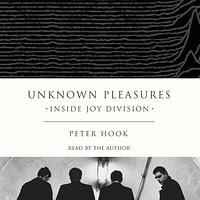Take a photo of a barcode or cover
"he said he was all right so we carried on" yup..
(no need for the slur near the end, could've just said "trans"..)
(no need for the slur near the end, could've just said "trans"..)
Moderate: Self harm, Suicide, Suicide attempt
funny
reflective
fast-paced
emotional
reflective
fast-paced
Okay I'm a massive Joy Division fan and in the days before everyone around the band or in it rushed wrote a memoir, or made a film, I was scrabbling around for any little clue about the band from clippings in the music press or whatever. I bought all the bootleg tapes of live gigs and listened to them for hours on end drawing my own interpretation of what was going on psychologically between the band members. And now that I've only slightly less desperately devoured the films and the books that have come out in the last decade, I feel they have added very little new insight to those I'd culled for myself twenty years ago. Which is odd because one of the books was written by the singer's wife and this one by the bass guitarist.
It's not often I'll read a book about a musician or band I'm not a massive fan of – but Joy Division hold an iconic place in British music history and all the reviews were glowing.
Oh, and it was two for £5 in HMV so, ya know...
Obviously, being there from the off bassist Peter Hook is perfectly placed to tell the story of one of the most influential bands of the last 40 years — and as with everything about the band, the book carries the long shadow of the late Ian Curtis.
And in may ways, that's what this book is about. While Hook recounts the early gigs, the writing and recording sessions etc, Ian's health and personal issues are at the forefront of his mind throughout.
Partly because they shaped the Division story, obviously, but also because the bass player is obviously still coming to terms with his friend's suicide all those years ago.
And it's that openness, that willingness to talk frankly and honestly about what Hook experienced and witnessed back than that makes Unknown Pleasures such a brilliant read.
He's frank, funny and has clearly written the whole thing himself – including the frankly fantastic track-by-track breakdown of both albums, which he rightly advises should be read while listening to the music.
The book can be a little tough to get through at times, as Hook is happily prone to wandering off at tangents meaning a more linear narrative is here in spirit only. There are also ‘timeline’ chapters which don't really add anything to the main story and should have either been incorporated into the body of the book or left behind as an interesting idea.
But such grumbles are minor, and in no way overshadow the power of this book.
It's moving, funny, insightful, informative — and, something that will surprise no one who knows me, resulted in me buying both albums and a compilation the moment I finished reading it.
Oh, and it was two for £5 in HMV so, ya know...
Obviously, being there from the off bassist Peter Hook is perfectly placed to tell the story of one of the most influential bands of the last 40 years — and as with everything about the band, the book carries the long shadow of the late Ian Curtis.
And in may ways, that's what this book is about. While Hook recounts the early gigs, the writing and recording sessions etc, Ian's health and personal issues are at the forefront of his mind throughout.
Partly because they shaped the Division story, obviously, but also because the bass player is obviously still coming to terms with his friend's suicide all those years ago.
And it's that openness, that willingness to talk frankly and honestly about what Hook experienced and witnessed back than that makes Unknown Pleasures such a brilliant read.
He's frank, funny and has clearly written the whole thing himself – including the frankly fantastic track-by-track breakdown of both albums, which he rightly advises should be read while listening to the music.
The book can be a little tough to get through at times, as Hook is happily prone to wandering off at tangents meaning a more linear narrative is here in spirit only. There are also ‘timeline’ chapters which don't really add anything to the main story and should have either been incorporated into the body of the book or left behind as an interesting idea.
But such grumbles are minor, and in no way overshadow the power of this book.
It's moving, funny, insightful, informative — and, something that will surprise no one who knows me, resulted in me buying both albums and a compilation the moment I finished reading it.
Peter Hook tal vez no sea el narrador más fiable, pero es honesto y desmitificador. Este libro está lleno de humor y dolor. Y es un pedazo de mis quince años.
dark
emotional
funny
inspiring
sad
medium-paced
Good book, this one & I've read a lot of Factory Records history. Plenty of witty detail and Hook's honest view of the JD years, it's a fun and entertaining read with quite a lot of information I've not picked up before. If you're going to pick up any books by the band members then Hook's are the ones to go for. Morris' are entertaining in their own quirky way but Sumner's is just detached and rushed.
Really enjoyed this one, he writes really well about the songs / technical (muso) bits. Docked half a star as too many “touring japes” stories for me but still very good and a great read even if you don’t know Joy Division / New Order very well
A most, enjoyable and candid book by Peter Hook covering his early years and the career of Joy Division brought to a halt by the suicide of Ian Curtis.
Lots of great stories of life in a band, countered with the questioning of himself about why and how nothing was done to help to support Curtis.
Lots of great stories of life in a band, countered with the questioning of himself about why and how nothing was done to help to support Curtis.






